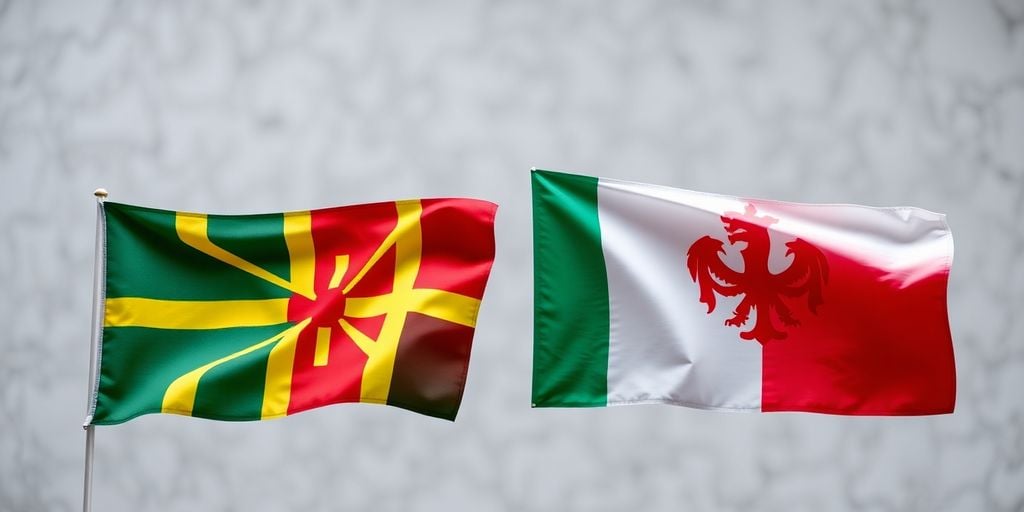North Macedonia’s long-standing ambition to join the European Union faces significant obstacles, primarily due to ongoing disputes with neighboring Bulgaria. Despite having candidate status for nearly two decades, Skopje’s path to full membership is stalled by Sofia’s demands, particularly concerning historical and identity issues, including the recognition of a Bulgarian minority in North Macedonia’s constitution.
A Decades-Long Wait
North Macedonia’s journey toward EU membership has been protracted, marked by successive hurdles:
- 2000: Received association status with the EU.
- 2005: Granted candidate status, alongside Croatia.
- 2008: Received the first recommendation to open accession talks.
While Croatia became an EU member in 2013, North Macedonia remains in limbo. Deputy Prime Minister Aleksandar Nikoloski highlighted the frustration, noting that his entire adult life has been spent awaiting EU accession. He pointed out that after resolving a long-standing veto from Greece in 2018 and a temporary block from France in 2019, Bulgaria imposed its own veto in 2020.
The Bulgarian Blockade: Identity and Language
Bulgaria’s primary demands revolve around historical and identity issues, including the constitutional recognition of a Bulgarian minority in North Macedonia. Nikoloski argues that Bulgaria is leveraging its EU membership to pressure North Macedonia, disregarding its language, culture, and national identity. He also noted that Bulgaria has not implemented 14 decisions by the European Court of Human Rights concerning the Macedonian minority in Bulgaria.
This dispute has spilled into the European Parliament, where a recent report on North Macedonia’s progress saw the removal of terms like "Macedonian identity" and "Macedonian language" from its final version, a move perceived as an insult by Skopje. Thomas Waitz, the European Parliament rapporteur on North Macedonia, even reported receiving death threats and facing coordinated pressure campaigns from Bulgarian MEPs over his work on the report.
EU’s Stance and North Macedonia’s Response
EU foreign policy chief Kaja Kallas has expressed strong support for North Macedonia’s EU path, emphasizing that the country belongs in the bloc. However, she stressed that progress hinges on domestic reforms, including the constitutional amendment to recognize the Bulgarian minority. Kallas stated, "North Macedonia faces era-defining choices for its citizens and its future."
North Macedonian Prime Minister Hristijan Mickoski maintains that Bulgaria must first approve North Macedonia’s membership before any constitutional changes are made. He asserted that North Macedonia deserves fair treatment and consistent leadership from the EU, having built a democracy based on European values.
Key Takeaways
- North Macedonia’s EU bid is stalled by Bulgaria’s demands for constitutional recognition of a Bulgarian minority.
- The dispute involves deeply rooted historical and identity issues, including the recognition of the Macedonian language and identity.
- EU officials, while supportive, emphasize the need for North Macedonia to undertake necessary reforms, including constitutional amendments.
- North Macedonia’s leadership insists on EU membership approval before constitutional changes, highlighting the bilateral nature of the dispute.
- The ongoing impasse underscores the complexities of EU enlargement, particularly in the Western Balkans, where historical grievances often intertwine with accession criteria.
Sources
- Bulgaria abuses its position to block our EU membership: North Macedonia’s Deputy PM Nikoloski, France 24.
- Kallas backs North Macedonia’s EU membership progress despite ongoing obstacles, Euronews.
- European MPs’ Report Revives Bulgaria-North Macedonia Identity Battle, Balkan Insight.
- EU presses North Macedonia to make ‘era-defining’ decisions for membership, AP News.
- Bulgarian MEPs Accused of Sabotage as EP Rapporteur on North Macedonia Reports Death Threats, Novinite.com.






